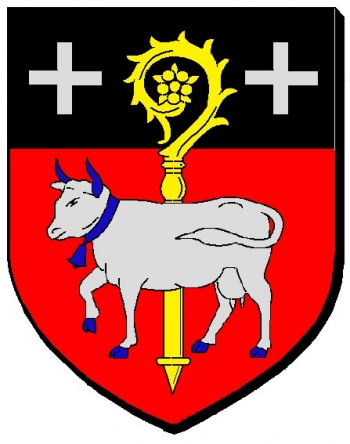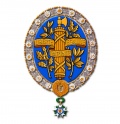La Vacquerie-et-Saint-Martin-de-Castries: Difference between revisions
Knorrepoes (talk | contribs) m (Text replacement - "|Blason de {{PAGENAME}}]]" to "|Blason de {{PAGENAME}}/Coat of arms (crest) of {{PAGENAME]]") |
Knorrepoes (talk | contribs) m (Text replacement - "↵↵''' {{uc:" to "''' {{uc:") |
||
| Line 1: | Line 1: | ||
''' {{uc:{{PAGENAME}}}} ''' | ''' {{uc:{{PAGENAME}}}} ''' | ||
Revision as of 08:34, 28 December 2023
LA VACQUERIE-ET-SAINT-MARTIN-DE-CASTRIES
Département : Hérault
| French | De gueules au chef de sable chargé de deux croisettes d'argent; à la crosse d'or brochant sur le tout; à la vache passante d'argent accornée, onglée, colletée et clarinée d'azur brochant sur le champ et la crosse. |
| English | blazon wanted |
Origin/meaning
The arms were adopted in June 2003.
The cow (vache) is a canting element for La Vaquerie. In 1832 it was merged with the hamlet of Saint-Martin-de-Castries and the two crosses refer to the two villages.
The black chief refers to the local (dark) caves and the prehistoric inhabitation of the area. The crosier refers to the Bishop of Lodève and the Abbot of Saint-Guilhem to whom the village historically belonged. The red colour is the colour of the Languedoc region.
Literature: Image from http://www.armorialdefrance.fr
French heraldry portal
This page is part of the French heraldry portal |
Heraldry of the World |
|
French heraldry:
Overseas territories:
|
Selected collector's items from France:
|
Contact and Support
Partners:
Your logo here ?
Contact us
© since 1995, Heraldry of the World, Ralf Hartemink 
Index of the site












